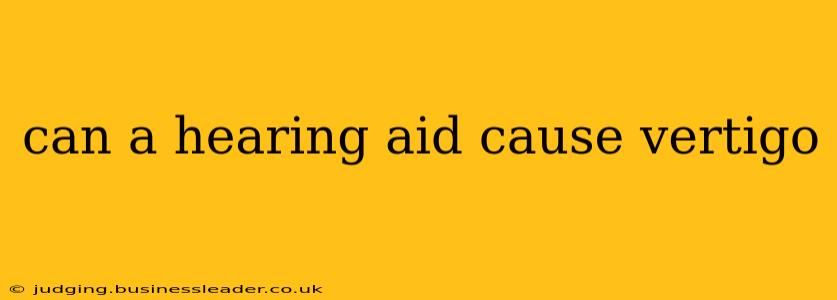Can a Hearing Aid Cause Vertigo? Understanding the Connection
Vertigo, that unsettling sensation of spinning or dizziness, can be a debilitating experience. While it's not a common side effect, some individuals report experiencing vertigo after getting a hearing aid. This raises a crucial question: can a hearing aid actually cause vertigo, or is there another underlying issue at play? The answer, unfortunately, isn't a simple yes or no. Let's explore the possible connections and what you should do if you experience this.
What are the Potential Causes of Vertigo Related to Hearing Aids?
Several factors can contribute to the feeling of vertigo after getting a hearing aid, and it's important to distinguish between direct causation and coincidental timing.
-
Ear Infection or Impacted Earwax: Vertigo can be a symptom of an inner ear infection or excessive earwax buildup. Getting a hearing aid fitted might coincide with an already developing ear infection or exacerbate existing wax issues, leading to vertigo. The process of fitting a hearing aid may also dislodge wax which can temporarily cause dizziness. This isn't the hearing aid causing the vertigo, but rather an existing condition being aggravated or revealed.
-
Improperly Fitted Hearing Aid: A poorly fitted hearing aid can irritate the ear canal, leading to discomfort and potentially feelings of imbalance that mimic vertigo. Pressure changes within the ear canal due to a poorly fitting device can also trigger dizziness.
-
Sudden Changes in Auditory Input: Hearing aids amplify sounds, and this sudden increase in auditory stimulation can overwhelm some individuals, especially those with pre-existing balance issues or vestibular problems (related to the inner ear's balance system). This isn't a direct causal link but a reaction to the increased sound processing.
-
Psychological Factors: The anxiety and adjustment period following the acquisition of a hearing aid can, for some, manifest as dizziness or vertigo. The brain is adapting to new sound processing and this adaptation can be accompanied by physical discomfort.
Is it Common for Hearing Aids to Cause Vertigo?
No, it's not common for hearing aids to directly cause vertigo. More often, vertigo experienced after getting a hearing aid is related to pre-existing conditions or the adjustment period. The connection is often coincidental rather than causal.
What Should I Do If My Hearing Aid Seems to be Causing Vertigo?
If you experience vertigo after getting a hearing aid, the first step is to contact your audiologist or hearing healthcare professional. They can:
- Check the fit of your hearing aid: Ensure it's properly fitted and isn't causing irritation or pressure.
- Examine your ear canal: Rule out an infection or excessive earwax.
- Adjust the hearing aid settings: Gradually increase the amplification to allow for adaptation.
- Refer you to another specialist: If necessary, they might refer you to an ENT (Ear, Nose, and Throat) doctor or a vestibular specialist to diagnose and treat any underlying balance problems.
How Can I Prevent Vertigo Related to Hearing Aids?
-
Proper cleaning and maintenance: Regular cleaning of your hearing aid can prevent wax buildup, reducing irritation and the potential for dizziness.
-
Gradual adjustment: Allow your brain time to adjust to the increased auditory input from the hearing aid. Start with shorter usage periods and gradually increase the wearing time.
-
Inform your audiologist about any balance issues: Disclose any history of vertigo or balance problems to your audiologist before fitting. This allows for a more cautious and personalized approach.
In summary, while a direct causal link between hearing aids and vertigo is uncommon, it's essential to address any dizziness experienced after getting a hearing aid. Consult your healthcare provider to rule out underlying medical issues and ensure your hearing aid is properly fitted and adjusted. With proper care and attention, you can significantly reduce the risk of experiencing vertigo related to your hearing aid.
